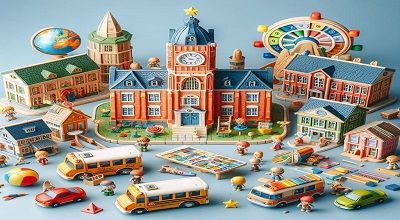Educational Toys for Kids 5-7
Educational toys for kids aged 5-7 can play a crucial role in their cognitive and skill development. Here are some suggestions for educational toys that cater to various aspects of learning:
Building Blocks and Construction Sets:
- Lego sets or other building blocks help develop fine motor skills and spatial awareness. Kids can also learn basic engineering and problem-solving as they create structures.
Puzzles:
- Jigsaw puzzles are excellent for developing problem-solving skills, spatial reasoning, and patience. Look for puzzles with age-appropriate difficulty levels.
Educational Board Games:
- Games like “Candy Land,” “Chutes and Ladders,” or “Sequence for Kids” can teach counting, color recognition, and strategy.
Math Manipulatives:
- Consider toys that involve counting, sorting, and basic math concepts. For example, you can use colorful counters or math cubes for hands-on learning.
Educational Apps and Software:
- Tablets or computers with educational apps can make learning fun. Look for apps that focus on early literacy, numeracy, and critical thinking.
Art Supplies:
- Encourage creativity with art supplies like crayons, colored pencils, and washable markers. Drawing and coloring help with fine motor skills and self-expression.
Science Kits:
- Simple science kits can introduce kids to basic scientific principles through hands-on experiments. Look for age-appropriate kits that cover topics like magnets, simple chemistry, or plant growth.
Reading Games and Books:
- Interactive reading games or electronic learning systems can help with literacy skills. Additionally, age-appropriate books that match their reading level can foster a love for reading.
Musical Instruments:
- Basic musical instruments like a small keyboard, a xylophone, or a simple drum set can introduce kids to the world of music and rhythm.
Coding Toys:
- There are coding toys designed for young children that teach basic programming concepts through play. These toys often use simple block-coding systems.
Geography Puzzles and Maps:
- Introduce geography with puzzles that feature world maps or country shapes. This can help kids become familiar with the world around them.
Educational Videos and DVDs:
- Choose educational videos that cover topics like nature, science, or history. Many educational series are designed specifically for young children.
Summary
When selecting toys, it’s important to consider your child’s interests and developmental stage. Toys that are both entertaining and educational can provide a well-rounded learning experience. Additionally, spending quality time playing and engaging with your child during these activities can enhance the educational value.
